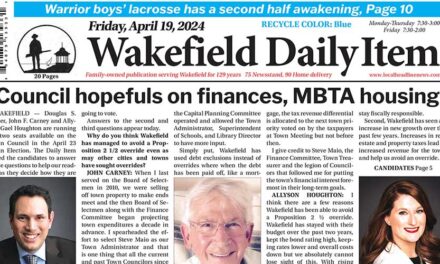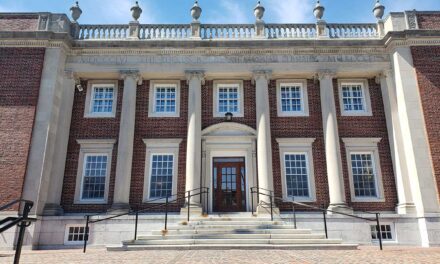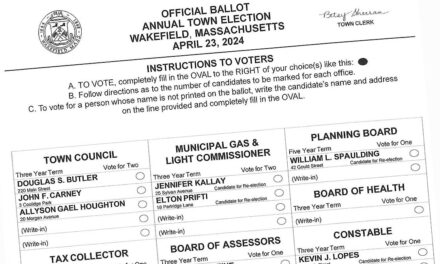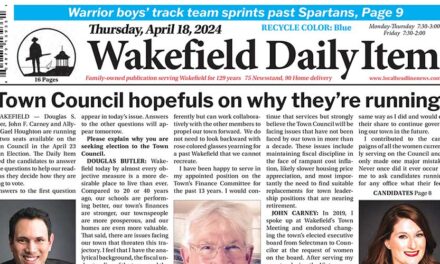By GAIL LOWE
WAKEFIELD — The second deadliest fire ever to strike America — the Cocoanut Grove fire of 1942 — will be the topic of discussion at the second lecture of the 2017 Sweetser series.
Guest speaker Stephanie Schorow will take ticketholders on a visit to the past at 7:30 p.m., Wednesday, April 12 when she talks about a book she wrote on the subject titled “The Cocoanut Grove Fire.” Signed copies will be available for sale following her talk.
The lecture will take place inside The Savings Bank Theatre at Wakefield Memorial High School, 60 Farm St.
On the night of Nov. 28, 1942, 492 people perished as a result of the Cocoanut Grove fire. The club was located on Piedmont Street near Boston’s Park Square.
The 1903 Iroquois Theatre fire in Chicago is the only one to have had a higher death toll — 690 people.
According to news reports, the Cocoanut Grove nightclub’s authorized capacity was 460 people. The fire led to a reform of safety standards and codes across the country and to major changes in the treatment and rehabilitation of burn victims internationally.
Schorow said she is continually amazed at the impact the fire had on the population in the Boston area.
“Almost every native Bostonian has a story about the fire — many from tales told by parents and grandparents,” she said. “The death of nearly 500 people and the injury of hundreds more sent a chill through the region. The fire has so many threads, from personal heroics and losses, the advances in burn treatment that resulted and its precedents for advances in burn treatment and for manslaughter law in the judicial system.”
Schorow added that there are still many mysteries about the fire, and she continues to learn more details even now.
Schorow’s book on the Cocoanut Grove fire, like her other books, is based on extensive reading of published material, including newspaper accounts and personal interviews.
“I was lucky enough to interview a number of survivors of the fire,” she said. “Many other researchers, such as the late Charles Kenny, were very generous with the information I had collected,” she said. “I tell my students that not everything is on the Internet. A Google search only goes so far. You have to get out there and talk to people.”
Much of what was published in newspapers about the fire turned out not to be true, according to Schorow. She said that at one point she had a long interview with Marty Sheridan, a man who was in the nightclub on the night of the fire and was listed as deceased on the front page of the Boston Globe in a story about the tragedy.
“Marty actually survived, and we had a memorable interview,” she said.
Schorow underscores the fact that a tragedy of the Cocoanut Grove’s proportion can happen to anyone.
“It can happen to you,” she said. “Regulations and safety precautions may seem onerous or unnecessary — until disaster strikes. Then you’ll be grateful for sprinkler systems or safety lights or exits that are not kept locked. Codes surely add to the cost of projects, but the majority of the Cocoanut Grove fire deaths could be attributed to the conditions of the club, including overcrowding, locked exits and little access, as much as to the flames and smoke.”
The Chicago native said she “wandered for many years” before coming to Boston. After graduating from Northwestern University with a degree in journalism, she worked for small and mid-sized newspapers in Missouri, Utah, Idaho and Connecticut.
She came to Boston in 1989 to work for the Associated Press with the idea that she would work there for a few years. Almost immediately, however, she felt that Boston was her home and the place she was meant to be.
For 12 years she worked as a reporter and editor at the Boston Herald and that cemented her love of the city’s history, its quirks and culture.
She now works as a freelance writer and journalism instructor and has no plans to leave.
Admission is $25 for a ticket that covers all three lectures, $10 at the door and $5 or students. The venue is handicap accessible.
The last lecture in the 2017 series will be held Wednesday, May 3 when author Stephen Puleo speaks about his latest book “American Treasures: The Secret Efforts to Save the Declaration of Independence, the Constitution and the Gettysburg Address.”




